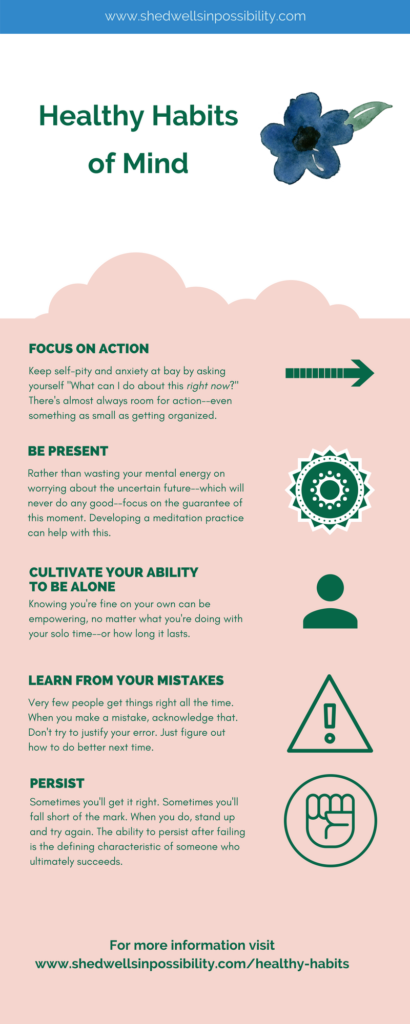I’ll be honest: I kind of hate it when people say things like “You’re such a strong person, you can handle this.” I know they mean well, but the implication is that “this”–whatever it happens to be–is no big deal, since you’re strong. And no one ever says “Oh wow. This is going to be awful, since you’re so weak.” That fact just makes the whole “You’re so strong” thing feel even more disingenuous.
The problem with using the word strong is that it suggests our very human struggles with difficult challenges occur as the result of our own weakness. If you tell a friend who’s battling terminal cancer “You’re strong, you’ll beat this,” what she’s likely to hear is that her impending death is her own fault. She just wasn’t strong enough to survive.
That’s why it bothers me to hear people talk about being “mentally strong” (or its close cousin, “mentally tough.”)
It’s certainly true that there are healthy habits of mind–ways of processing difficult moments that help us get through them and move forward productively. But this, to my mind, is completely different from being strong. Healthy habits are helpful in very specific ways.
Focus on action
When you’re in the middle of a difficult moment, your first impulse is often to fix whatever’s wrong. But complex problems can’t be easily fixed; they often involve multiple people, or multiple causes. And some problems–like those involving our physical health–can’t be fixed. They can only be accommodated.
Keeping your focus on action helps remind you that there are things you can control. Those actions might be small, in comparison to the problem itself, but they’ll give you something to do. Perhaps most importantly, doing many small things will keep you busy. That minimizes the time you can spend on worrying about the uncertain future.
Be Present
There’s a lot of talk about mindfulness in the popular media these days. Mindfulness simply means awareness. It means making yourself aware that this moment, right now, is the only one you’re guaranteed. If you waste it on worry, you’re missing out on the only sure thing in your life.
Guided meditation is a healthy way to practice mindfulness. (I’m a big fan of the Calm app for this purpose.) Very simply, guided meditation involves becoming focused on your physical presence–your breath and your body–which leaves no room for abstractions like worry. It takes some practice, but giving yourself even a few moments’ reprieve can be rejuvenating. It certainly makes me feel more at peace.
Cultivate Your Ability to Be Alone
Especially for women, this one can be rough. We’re taught early on to stay in groups, for safety’s sake. If we end up in partnered relationships, we get used to having someone to lean on. In fact, we’re encouraged to lean.
My next door neighbor, now a widow, told me this recently: “I just got used to having a guardrail. After he was gone, I had to remind myself that I knew how to walk down the stairs by myself. I wasn’t going to fall just because that guardrail wasn’t there. I was only going to fall if I didn’t pay attention to the stairs.”
You don’t have to take a solo journey in the wilderness to cultivate your ability to be alone. You can start without ever leaving your house–by learning how to pay the monthly bills on your own, for example, or replace the air filter in your furnace. Small things like this can build your sense of autonomy, come what may.
Learn From Your Mistakes
We’re all going to mess up. When that happens, the best thing we can do is learn from our mistakes and avoid repeating them. In my younger years, I devoted a lot of time and energy to explaining how I absolutely was not wrong, even when I knew that I was. (And then, of course, I’d have to repeat the behavior to prove just how absolutely not wrong it was.)
What I didn’t understand back then was that admitting to your mistakes is liberating. I messed up. That’s all it takes to free yourself.
Rather than coming up with justifications–or insisting I was wrong, but so were you–just acknowledge your error. Whether another party wants to do the same is their choice, over which you have no control. The sooner you admit your misstep, the sooner you can move forward in a different direction. Give yourself the gift of that freedom.
Persist
Most of us are going to face failure at one time or another. Some of us will take that failure as a sign that it just wasn’t meant to be. Others will decide to use that failure as a learning experience. We will persist.
There’s a difference between persistence and stubbornly repeating a mistake, of course. Knowing the difference between those two things is crucial. Healthy persistence is marked by incremental progress toward a goal; destructive loops of behavior lead to the exact same results. If you find yourself dealing with the same problem over and over again, it’s time to consider whether a stubborn refusal to learn is getting in your way.
The next time someone says something like “You’re so strong,” I’m hoping I’ll remember to reply by substituting one of the healthy habits I try to employ: I’m persistent, that’s for sure. Maybe, by naming what it takes to stay healthy in the face of life’s challenges, we can help each other thrive.






No Comments